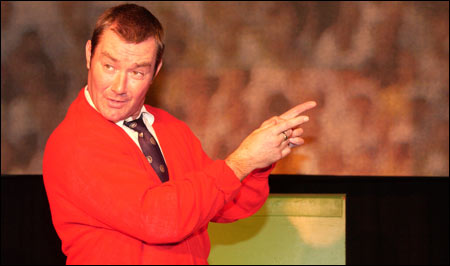You hardly know whether to exude an exculpatory tear or a banshee scream this week. But if you’re Irish, the answer is probably both, a proud excess seeming to swim in the genes. In Marie Jones’s A Night in November (at Jimmy Tingle’s Off Broadway through November 26), an uptight Belfast bureaucrat goes to a soccer game and appears to get hit over the head with the ball, his bigoted brain suddenly exploding in an epiphany of mortification at his and his fellow Northern Irish Protestants’ treatment of their Catholic neighbors. And in Marina Carr’s By the Bog of Cats (at Devanaughn Theatre through October 29), Medea takes a trip to the Irish midlands, a fierce locale bathed in vapors atmospheric and ectoplasmic. Both plays gather steam from the pungent and volatile marsh of Irish history encroaching on the present. But By the Bog of Cats is both more melodramatic and more complex. The upbeat A Night in November is too black-and-white for its own good. Even so, dynamo Marty Maguire, playing some 25 parts in the one-man plea for sectarian tolerance, motors us from Belfast to Dublin to New York on the high-octane fuel of his performance.

A NIGHT IN NOVEMBER: Marty Maguire proves one can be a crowd.
|
There’s nothing subtle about the 1994 A Night in November, an earlier effort by the Olivier Award–winning author of Stones in His Pockets. That 1999 work at least divides its diverse dramatis personae between two actors, who play not only hapless extras in an American film being shot in rural island but also everyone else. In this one, Maguire, who won a New York Drama Critics Circle Award (among others) for his performance, goes it alone. Energetic and comically gifted, he’s like an Irish Red Skelton under hot lights, sweating away as his rubber face melts into a plethora of amusingly exaggerated countenances.
At the center of this soccer-catalyzed whirlwind by a playwright who is herself an Ulster Protestant is Kenneth Norman McAllister, a Belfast dole clerk, henpecked husband, and father of two who has just experienced the inestimable elation of having been admitted to the local golf club — an honor made the sweeter by his Catholic boss’s having been excluded. Kenneth — whom we first meet knees on floor, butt in our faces, as he looks under his car for an explosive device — has lived his whole life in a city defined by sectarian separatism and violence, with his lot enjoying its upper hand. But in November of 1993, the bureaucrat’s tidy world is blown apart when he grudgingly escorts his cigarette-sucking, emphysema-ridden father-in-law to a World Cup qualifier at Belfast’s Windsor Park Stadium between Northern Ireland and the Republic of Ireland. Aghast at the vitriol being spewed by his fellow Protestants, Kenneth is set adrift from his moorings and becomes a man alienated from his tribe. Then in act two, as his marriage and friendships fall apart, he gets it into his head to drive across the border on a stealth mission to Dublin’s airport to accompany a mass of sport-crazed Irish to New York, where the Republic is to play Italy in the World Cup. And bingo, he belongs: he has become a Protestant who identifies himself not as a stiff Brit once removed but as a true Irishman.
A Night in November, in which every Protestant is a social-climbing prig with a manicured lawn and every Catholic warm and welcoming, is a rather lopsided lesson in sectarian healing and national pride. But in this very successful Tim Byron Owen–directed revival of the work, which originated in Los Angeles and then traveled to London, Edinburgh, Dublin, and New York before coming here, the Saul-like, soccer-sped conversion of Kenneth McAllister is exuberant, entertaining, and sometimes even touching, if over-simple. The trick is that Maguire makes the central character the sympathetic human eye of a storm of brilliant caricature (with the exception of Jerry, the relaxed Catholic boss). Some clowns are as likable as the sloshed and exhilarated Irish compatriots with whom Kenneth takes in the World Cup; others are as reprehensible as the father-in-law, whose addled excretions of prejudice are as disgusting as the phlegm he coughs up between red-faced drags on his fag. Maguire creates precise if exaggerated portraits of Kenneth’s cigarette-brandishing, house-proud wife and of the couple’s pretentious, not-too-bright friends, among others. Most impressive, though, is his conjuration of a giddy sport- and booze-fueled throng. If Stones in His Pockets shows how two can be a company, Maguire proves one can be a crowd.
ADVERTISEMENT
 |